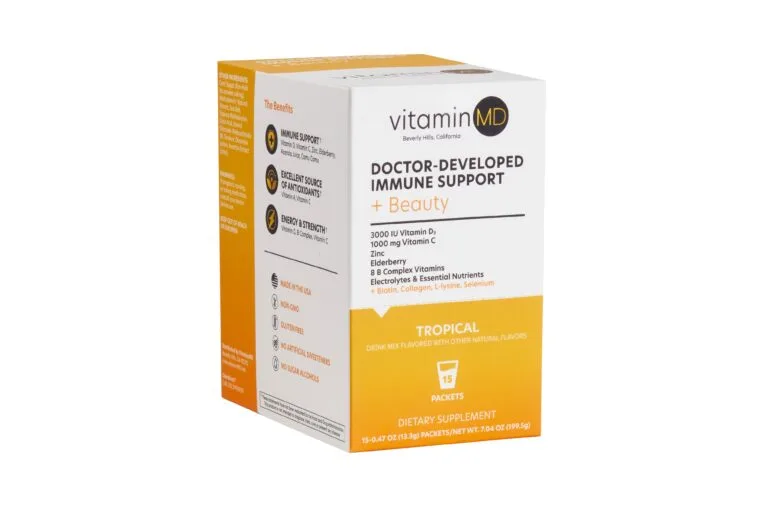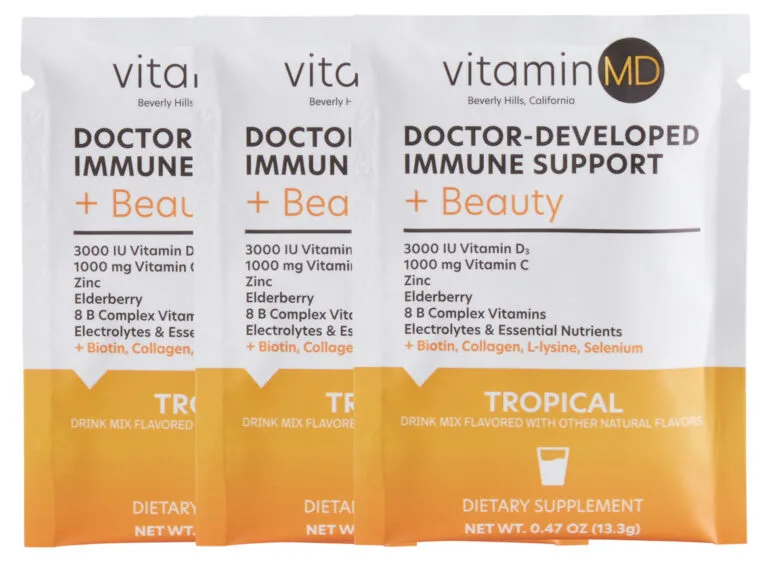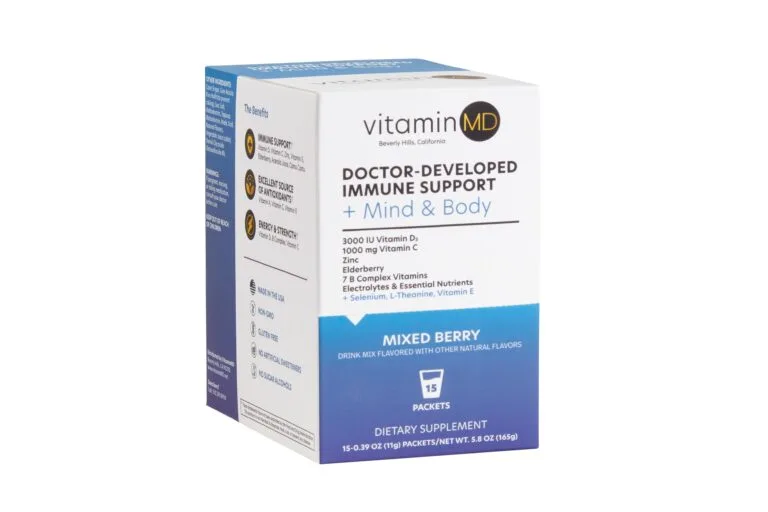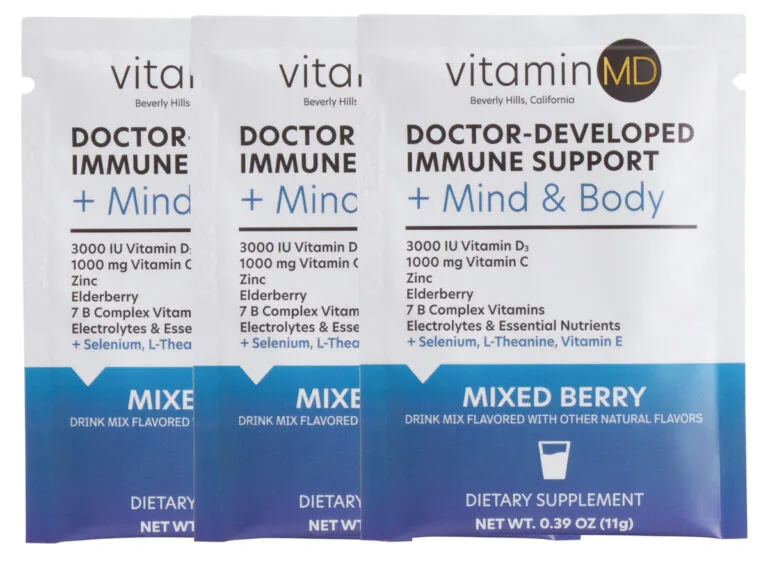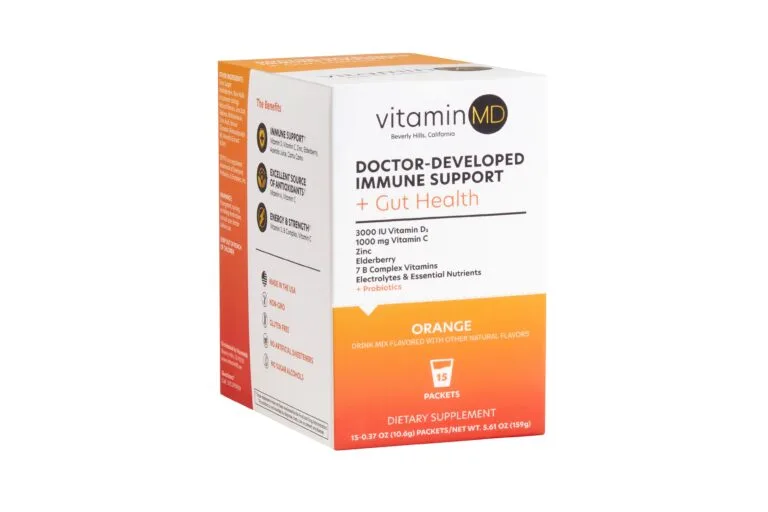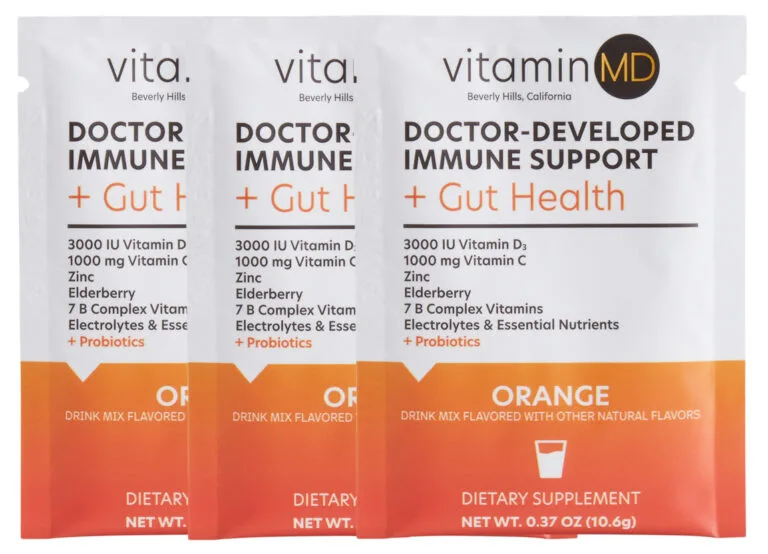
Many people use vitamins to help them lose body fat, but are they effective?
There are numerous supplements over the counter that promise to aid in weight loss, and it can be difficult to decide which ones are the most effective. Supplement companies frequently promote their products as the greatest method to reduce body weight, but many of these claims are baseless. Various weight loss supplements and vitamins that contain b12, b complex and vitamin D, iron, magnesium can help increase metabolism and help with weight loss. The vitamin packets created by VitaminMD were created to boost energy levels, immune system, help in hair growth, gut health, cognitive function as well as aid in weight loss. Other supplements that have shown be helpful in weight loss are, green coffee bean extract, and glucomannan.
These weight loss products may increase your energy levels and improve your well-being during the day. However, it is important to recognize that not all supplements are created equal – so make sure you choose wisely!
Our medical practice also offers telehealth consults for patients who are in need of a consultation for weight loss or are interested in starting a weight loss medication such as a GLP-1 agonist. We understand that supplements can be a crucial part of the equation, and we are here to assist you in selecting the best weight-reduction pill or supplements that fits your specific.
What are some natural ways to lose weight?
While there are numerous approaches to achieve this goal, natural alternatives typically hold the most desirable result: being both effective and beneficial for overall health. To help you kickstart your weight loss journey, we’ve provided some tips on how to lose belly fat with nature-based solutions!
Drink honey-sweetened lemon water
The combination of the two ingredients is abundant in vitamins and minerals, which help to boost metabolism, reduce appetite, and provide overall health benefits.
Honey is naturally sweet and high in antioxidants, which can even aid in constipation. Lemon is also a natural weight reduction aid due to its high citric acid, which aids in fat cell breakdown. Regularly drinking honey-sweetened lemon water can help you lose weight by reducing your appetite, increasing your metabolic rate, and improving your overall health.
Eat fewer high-calorie items and snacks
It is easy to indulge in high-calorie foods and snacks if we are not mindful of our calorie intake. Rather than eating junk and processed foods, it is better to have a well-balanced diet with adequate protein, carbohydrates, and healthy fats present in each meal.
Take a platter of fruits and vegetables, as well as whole-grain bread and cereals, for your daily healthy diet. These foods are packed with fewer calories yet won’t result in weight gain since they help support your weight loss efforts without causing anxiety about possible gains. By adopting a few simple lifestyle changes, you can achieve your weight loss goals!
Consume oolong tea
Oolong tea is a delicious and healthy beverage that can help you reduce weight. Oolong tea is a traditional Chinese tea that is semi-oxidized and contains caffeine and polyphenols. Studies have found that drinking oolong tea can help increase your body’s fat-burning capabilities and reduce the absorption of fat enzymes in your intestines. It’s an easy way to boost your metabolism and kickstart your weight loss goals naturally.
Caffeine and oolong tea both increase energy expenditure, and oolong tea, but not caffeine enhances fat oxidation. The short-term effects of caffeine, such as increased heart rate and interference with sleep, diminish over 1–4 days, known as caffeine tolerance.
Eat healthy fats like olive oil and avocado
Healthy fats, such as olive oil and avocado, are high in vitamins and minerals that can assist in supporting your body’s wellness. Olive oil is high in monounsaturated fatty acids, which can help lower bad cholesterol and raise good cholesterol. Avocado is high in dietary fiber and includes monounsaturated fats, which can help balance blood sugar levels. Avocados are also rich in potassium, magnesium, folate, and vitamins C, K, and B6. Incorporating these substances may give several health benefits.

Physical activity
Regular physical activity can help you improve your physical and mental health, enhance your energy levels, lower your risk of chronic diseases, and improve your mood. Aerobic exercises, strength training, flexibility exercises, balance exercises, and sports activities are just a few examples of physical activities. It is critical to pick an activity that you enjoy, and that works into your schedule. You should also acquire clearance from your healthcare professional before beginning any new fitness program.
Increased physical activity is a crucial component of a complete weight-loss approach for overweight adults who are otherwise healthy. One of the best predictors of success in the long-term management of overweight and obesity is the ability to develop and sustain an exercise program (Jakicic et al., 1995, 1999; Klem et al., 1997; McGuire et al., 1998, 1999; Schoeller et al., 1997).
What are the best weight loss supplements?
For those looking for an effective weight loss option, there are numerous possibilities. Popular choices include certain diet pills, weight loss medications as well as natural dietary supplements that assert they simplify or expedite the process of significant weight loss when combined with other techniques, such as exercise.
Non-prescription medications for weight loss available over the counter
Glucomannan
Glucomannan is a supplement that has been making waves in recent years as an efficient means of weight loss. This polysaccharide – made up of chains linked together – can be found abundantly in plants, such as the Konjac root. It is well-known for offering numerous health benefits, including enhanced digestive well-being, bloating, and improved blood sugar regulation, alongside its capacity to encourage fat loss.
Evidence suggests that the utilization of glucomannan can be utilized to reduce body fat and body mass index (BMI) while simultaneously reducing cholesterol levels, lowering LDL (bad) cholesterol, enhancing HDL (good) cholesterol concentrations, and curtailing appetite. This can all result in a more sustainable diet regimen as one’s cravings may be significantly diminished over time, leading to fewer calories consumed throughout each day.
Konjac glucomannan (KGM) is a dietary fiber hydrocolloidal polysaccharide isolated from the tubers of Amorphophallus konjac. Throughout the last couple of decades, purified KGM has been offered as a food additive as well as a dietary supplement in many countries.
Green coffee bean extract
Green coffee beans are coffee beans that have not been roasted. Green coffee beans contain chlorogenic acid, which has been shown to help with diabetes, high blood pressure, heart disease, and weight loss and enhance glucose metabolism and blood sugar levels. The levels of chlorogenic acid are lowered when green coffee beans are roasted to make ordinary coffee beans.
The active ingredient in green coffee bean extract is chlorogenic acid, which has been subject to extensive clinical trials and has proven effective in stabilizing and reducing levels of sugar content within the body. In turn, this leads to a natural inclination for your body to seek out alternate sources of energy, such as fat deposits – aiding weight loss.
Conjugated linoleic acid
Conjugated linoleic acid (CLA) is a fatty acid that occurs naturally in dairy and some meats. CLA supplementation has been found in studies to help reduce body fat, particularly in the stomach area, as well as enhance body composition. Furthermore, CLA may aid in improving metabolic health, lean muscle mass, and inflammation.
We found 18 studies that met our criteria. Three of these trials were single-isomer investigations, with data comparing CLA isomers being equivocal. We examined the length of therapy in studies that employed a mixture of purified isomers and those that used purified trans-10 and cis-12 isomers.
Chromium picolinate
Chromium, specifically trivalent chromium, is a trace element that some people take as a supplement. Perhaps most crucially, chromium appears to improve the actions of insulin and lower glucose levels in the body. It did, however, have hazards, and its usage is rather disputed.
The response of a person to chromium depends on their chromium status, the diet they consume, and the amount and type of supplemental chromium they receive while undertaking studies. There have been no reported side effects associated with this mineral in nutritional trials – however, further research is needed.
L-carnitine
L-carnitine is a molecule that is produced in the human brain, liver, and kidneys. It improves the body’s conversion of fat to energy.
L-carnitine is essential for heart and brain function, muscular movement, and a variety of other bodily processes. The body can convert L-carnitine into acetyl-L-carnitine and propionyl-L-carnitine. However, it is unclear whether the benefits of these additional carnitines are the same.
Up until January 2019, online databases were searched. In total, 37 RCTs (with a total of 2292 individuals) were considered. Meta-analysis showed that l-carnitine supplementation significantly decreased body weight [Weighted mean difference (WMD) = -1.21 kg, 95% confidence interval (CI): -1.73, -0.68; P < 0.001], body mass index (BMI) (WMD = -0.24 kg/m2, 95% CI: -0.37, -0.10; P = 0.001), and fat mass (WMD = -2.08 kg, 95% CI: -3.44, -0.72; P = 0.003).
Prescription drugs for weight loss
GLP 1 Drugs
GLP-1 medication or glucagon-like peptide-1 drugs are a class of medications that are typically used in the treatment of diabetes type 2. In the recent months they have gained popularity as a weight loss medication. GLP-1 is a naturally occurring hormone in the body that helps in the regulation of blood sugar levels. GLP-1 drugs act by mimicking the action of this hormone in our bodies. The end result is an increased insulin secretion and decreased glucagon secretion, resulting in lower blood sugar levels. The lowering of blood sugars in addition to decrease in appetite and feeling of fullness can be helpful in patients who are seeking to lose weight.
Some examples of GLP-1 drugs include:
Exenatide (Byetta, Bydureon)
Tizepatide (Mounjaro)
Liraglutide (Victoza, Saxenda)
Dulaglutide (Trulicity)
Semaglutide (Ozempic)
Albiglutide (Tanzeum)
These glp 1 agonsits are given by injection on a weekly bases and may be used alone or in combination with other diabetes medications, such as metformin. GLP-1 medications are not for everyone and our doctor can perform a telehealth consult with you and determine if you are a good candidate for this medication or not.
Appetite suppressant
Prescription appetite suppressants are medication that is prescribed by a doctor to be taken for the purpose of weight loss. These medications can help pacify your cravings and facilitate adherence to your diet plan. Commonly prescribed appetite suppressants include phentermine, diethylpropion, and phendimetrazine.
Most of the weight loss pills approved by the U.S. Food and Drug Administration (FDA) are for adults only. The FDA has approved two prescription drugs for children aged 12 and up: orlistat NIH external link (Xenical)2 and liraglutide (Saxenda). Setmelanotide (IMCIVREE),4 a third prescription drug, has been approved by the FDA for children aged 6 and up who have rare genetic disorders that cause obesity.[5]
Orlistat
Orlistat (brand name: Alli) is the sole FDA-approved medication for weight loss, with patients being advised to take it in conjunction with a reduced-calorie diet. Available as an OTC (over-the-counter) product at a 60 mg dose, this formulation of orlistat is suitable for adult individuals who are obese and over 18 years old.
Furthermore, there was a trend toward a higher reduction in liver fat (which is connected to dyslipidemia and insulin resistance separately) and intermuscular adipose tissue. (which is associated with metabolic abnormalities related to muscle and glucose metabolism).17 These data imply that orlistat 60 mg, in combination with a low-calorie, low-fat diet, could be an effective weight-loss therapy for decreasing metabolic risk factors associated with upper-body adiposity.
References
Zhang S, Takano J, Murayama N, et al. Subacute Ingestion of Caffeine and Oolong Tea Increases Fat Oxidation without Affecting Energy Expenditure and Sleep Architecture: A Randomized, Placebo-Controlled, Double-Blinded Cross-Over Trial. Nutrients. 2020;12(12):3671. doi:https://doi.org/10.3390/nu12123671
US) M. Weight-Loss and Maintenance Strategies. Nih.gov. Published 2023. Accessed April 9, 2023. https://www.ncbi.nlm.nih.gov/books/NBK221839/
Devaraj RD, Reddy CK, Xu B. Health-promoting effects of konjac glucomannan and its practical applications: A critical review. International Journal of Biological Macromolecules. 2019;126:273-281. doi:https://doi.org/10.1016/j.ijbiomac.2018.12.203
Whigham LD, Watras AC, Schoeller DA. Efficacy of conjugated linoleic acid for reducing fat mass: a meta-analysis in humans. The American Journal of Clinical Nutrition. 2007;85(5):1203-1211. doi:https://doi.org/10.1093/ajcn/85.5.1203
Prescription Medications to Treat Overweight & Obesity. National Institute of Diabetes and Digestive and Kidney Diseases. Published April 12, 2023. Accessed April 12, 2023. https://www.niddk.nih.gov/health-information/weight-management/prescription-medications-treat-overweight-obesity 6. Anderson RA. Effects of Chromium on Body Composition and Weight Loss. Nutrition Reviews. 2009;56(9):266-270. doi:https://doi.org/10.1111/j.1753-4887.1998.tb01763.x
Talenezhad N, Mohammadi M, Ramezani-Jolfaie N, Mozaffari-Khosravi H, Salehi-Abargouei A. Effects of l-carnitine supplementation on weight loss and body composition: A systematic review and meta-analysis of 37 randomized controlled clinical trials with dose-response analysis. Clinical Nutrition ESPEN. 2020;37:9-23. doi:https://doi.org/10.1016/j.clnesp.2020.03.008

